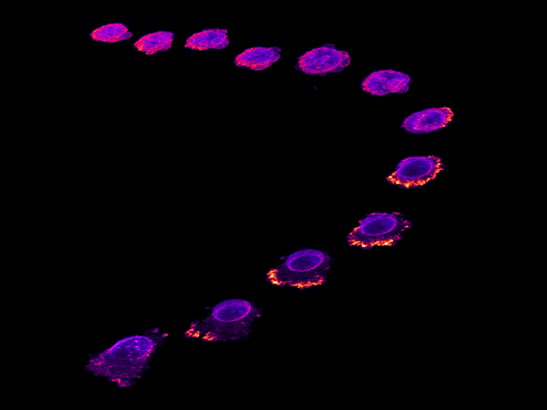
The Institute of Cancer Research, London, strongly welcomes the news that a new targeted breast cancer drug, capivasertib, has been approved by the US Food and Drug Administration (FDA) for treating the most common type of advanced breast cancer.
The decision means people with oestrogen receptor (ER) positive, human epidermal growth factor receptor 2 (HER-2) negative breast cancer, with specific genetic alterations (PIK3CA, AKT1 or PTEN gene mutations), that has progressed after standard treatments will be able to access the new drug in the US.
Mutations or alterations in the PIK3CA, AKT1 or PTEN genes are found in up to 50 per cent of patients with this form of breast cancer.
Approval in Europe and the UK could be next
The US approval raises hopes that the medicine could next be approved for use in Europe and the UK.
Capivasertib is a first-in-class drug that works in a new way, by blocking the activity of the cancer-driving protein molecule AKT. It was discovered by the pharmaceutical company AstraZeneca, following underlying and enabling fundamental research at The Institute of Cancer Research (ICR), which led to a programme of drug discovery research by the ICR and Astex Pharmaceuticals.
Results from the international phase III CAPItello-291 trial showed that capivasertib doubled the time it took for cancer to progress in people with advanced ER positive, HER-2 negative breast cancer – from 3.1 months for patients who received hormone therapy alone, to 7.3 months for those who received hormone therapy combined with capivasertib.
Participants on the trial had experienced their cancer recur or progress despite standard hormone treatments, and the majority had also previously been treated with a CDK4/6 inhibitor – a class of drugs that stop cancer cells from multiplying.
In the UK, patients with advanced ER-positive HER-2 negative breast cancer are otherwise left with the option to continue to receive fulvestrant hormone therapy, which is often ineffective, or chemotherapy, a treatment which carries debilitating side effects.
The phase III trial was led by Professor Nicholas Turner at the ICR and The Royal Marsden NHS Foundation Trust. It was sponsored and funded by AstraZeneca.
An ICR 'bench to bedside' success story
The development of capivasertib followed years of fundamental research at the ICR, aimed at understanding how the AKT protein molecule is regulated. In 2002, ICR scientists published the 3D structure of AKT and showed how the protein is activated – explaining how AKT exerts its cancer-driving behaviour.
Researchers in the ICR’s Centre for Cancer Drug Discovery, with funding from Cancer Research UK, established a drug discovery project and then worked in collaboration with Astex Pharmaceuticals to design small-molecule inhibitors which would target AKT, based on its 3D structure.
They used a technology called ‘fragment-based design’ where tiny fragments were initially found that attach weakly to the AKT protein, and then these were extended to produce a tighter fit and potent inhibition of AKT’s cancer-driving behaviour.
In 2005, a series of prototype drug compounds discovered by the ICR and Astex was shown to have very promising activity against a range of human tumours grown in mice and was licensed to AstraZeneca. Then, in 2010, AstraZeneca announced its discovery of capivasertib, and began to develop the drug as a potential treatment for various forms of cancer.
The initial clinical development of capivasertib was centred on an early-phase trial which was led by the ICR and its partner hospital The Royal Marsden. Subsequently, phase II studies were completed in the UK in collaboration with the UK Cancer Research Network.
The trials used biomarkers that were developed at ICR to show proof of concept that the AKT protein was inhibited by capivasertib.
Great science carried out by various partners
Professor Nicholas Turner, Professor of Molecular Oncology at The Institute of Cancer Research, London, and Consultant Medical Oncologist at The Royal Marsden NHS Foundation Trust, who led the CAPItello-291 trial, said:
"We are delighted that the FDA has approved capivasertib for patients with the most common type of advanced breast cancer, if they have tumours with mutations in one or more of the genes PIK3CA, AKT1 or PTEN. This means breast cancer patients with this kind of advanced disease, that has progressed on other treatments, will have an additional, targeted treatment option that will help keep their cancer from progressing for longer.
"We hope to see capivasertib next approved in Europe and the UK, and then made available on the NHS.”
Professor Kristian Helin, Chief Executive of The Institute of Cancer Research, London, said:
"Capivasertib represents a new class of treatment for breast cancer, which can help to slow down the cancer’s progression and give patients with advanced disease precious extra time living well.
"Decades of research by scientists at the ICR paved the way to the discovery of this drug by AstraZeneca and we're excited that it has reached the important milestone of receiving FDA approval. The development of capivasertib was driven through a unique collaboration between academia, charities, and industry – who together pioneered a new cancer drug.
“We hope to see capivasertib soon licensed by the MHRA and assessed by NICE so that women in the UK can gain access to this game-changing drug on the NHS as soon as possible."
Professor Paul Workman, former Chief Executive of The Institute of Cancer Research, London, and Director of the Centre for Cancer Drug Discovery (formerly the Cancer Research UK Cancer Therapeutics Unit) at the time, and an active researcher in the AKT drug discovery project, said:
“I am thrilled personally and on behalf of the fantastic drug discovery and development teams at the ICR, Astex and AstraZeneca. Even with all our new technologies, discovering innovative cancer drugs like capivasertib is a long and tough journey. Most of all I’m delighted that cancer patients can now finally benefit from the great science that was carried out by the various partners.”
.tmb-propic-md.jpg?Culture=en&sfvrsn=d41885a5_9)
 .
.